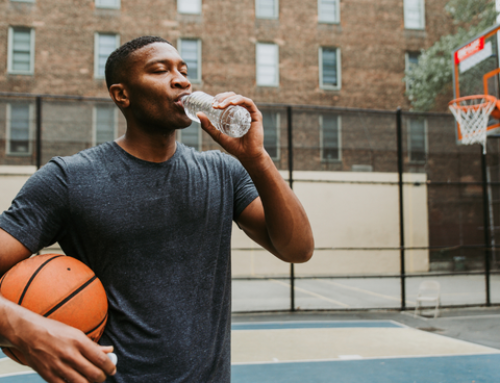Basic Tips to Stay Hydrated This Summer
Did you know that most of your body is liquid?
You’ve probably heard over and over about the importance of knowing how to rehydrate your body. It’s for good measure, though, because approximately 70 percent of your muscles, organs, blood and brain consist of water, which means losing fluid—even as little as one percent of your bodyweight—can decrease function on the field, court and classroom.
With hazy, hot and humid summer weather upon us, there is a greater chance of fluid loss, which could ultimately hurt your performance.
No one-size-fits-all prescription works for fluid intake, because proper hydration depends on age, gender, sport, heat, humidity, altitude and the amount of sweat a person loses. But here are some simple tips you can follow to make sure you stay hydrated.
General Hydration Guidelines
- Aim to drink 16 ounces of fluid two hours before exercise, practice or competition
- Sip eight to 10 ounces every 20 minutes during a game or competition (one sip = one ounce).
- Drink at least 16 to 24 ounces for every pound of body weight lost during activity
Hydration Plan
- Drink one or two glasses of water upon waking up in the morning
- Sip on a water bottle throughout the day, and visit the water fountain whenever you pass it
- Drink before you feel thirsty and continue to drink until you are no longer thirsty
Remember, if you feel thirsty, you’re already dehydrated. So don’t wait!
What Do You Need to Drink?
- Water: when you have a game or practice lasting less than one hour
- Sports Drink: when you have a match lasting over an hour, in hot and humid conditions, during or after a hard practice, or if your sweat is salty.
How to Rehydrate With Food
- At the end of a game or after practice, refuel with fresh fruits like melons, apples, oranges, tomatoes, grapes and strawberries to cut thirst and take in more fluids
- Other simple tips include eating soup (tough to consume on a hot day, but cold gazpacho is great), yogurt, frozen fruit bars and vegetables. Celery, squash, zucchini, lettuce, bell peppers, cucumbers and carrots are all good options.
How to Know if You’re Dehydrated
- An athlete should need to urinate every two to three hours
- Urine that is light in color (like lemonade) is a sign of proper hydration. Darker colors (like apple juice) can mean dehydration.
Practice Caution With Caffeinated Drinks
The more of these drinks you consume, the more fluid you can lose. This is dangerous if you’re already in a dehydrated state.
Now that you know how to rehydrate properly to play at the top of your game, follow your hydration plan each day and don’t let your body get thirsty!
RECOMMENDED FOR YOU
MOST POPULAR
Basic Tips to Stay Hydrated This Summer
Did you know that most of your body is liquid?
You’ve probably heard over and over about the importance of knowing how to rehydrate your body. It’s for good measure, though, because approximately 70 percent of your muscles, organs, blood and brain consist of water, which means losing fluid—even as little as one percent of your bodyweight—can decrease function on the field, court and classroom.
With hazy, hot and humid summer weather upon us, there is a greater chance of fluid loss, which could ultimately hurt your performance.
No one-size-fits-all prescription works for fluid intake, because proper hydration depends on age, gender, sport, heat, humidity, altitude and the amount of sweat a person loses. But here are some simple tips you can follow to make sure you stay hydrated.
General Hydration Guidelines
- Aim to drink 16 ounces of fluid two hours before exercise, practice or competition
- Sip eight to 10 ounces every 20 minutes during a game or competition (one sip = one ounce).
- Drink at least 16 to 24 ounces for every pound of body weight lost during activity
Hydration Plan
- Drink one or two glasses of water upon waking up in the morning
- Sip on a water bottle throughout the day, and visit the water fountain whenever you pass it
- Drink before you feel thirsty and continue to drink until you are no longer thirsty
Remember, if you feel thirsty, you’re already dehydrated. So don’t wait!
What Do You Need to Drink?
- Water: when you have a game or practice lasting less than one hour
- Sports Drink: when you have a match lasting over an hour, in hot and humid conditions, during or after a hard practice, or if your sweat is salty.
How to Rehydrate With Food
- At the end of a game or after practice, refuel with fresh fruits like melons, apples, oranges, tomatoes, grapes and strawberries to cut thirst and take in more fluids
- Other simple tips include eating soup (tough to consume on a hot day, but cold gazpacho is great), yogurt, frozen fruit bars and vegetables. Celery, squash, zucchini, lettuce, bell peppers, cucumbers and carrots are all good options.
How to Know if You’re Dehydrated
- An athlete should need to urinate every two to three hours
- Urine that is light in color (like lemonade) is a sign of proper hydration. Darker colors (like apple juice) can mean dehydration.
Practice Caution With Caffeinated Drinks
The more of these drinks you consume, the more fluid you can lose. This is dangerous if you’re already in a dehydrated state.
Now that you know how to rehydrate properly to play at the top of your game, follow your hydration plan each day and don’t let your body get thirsty!












